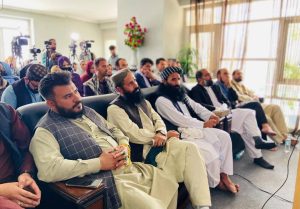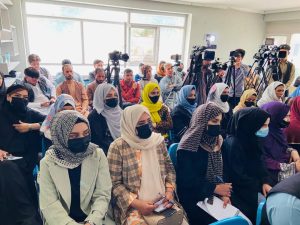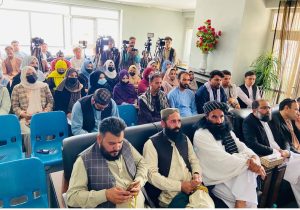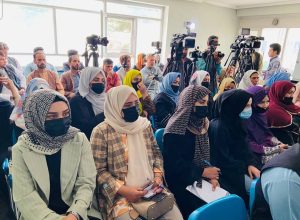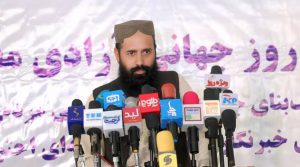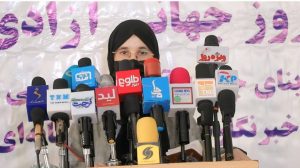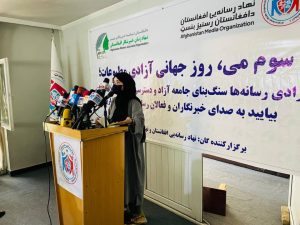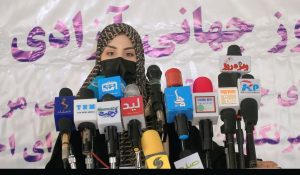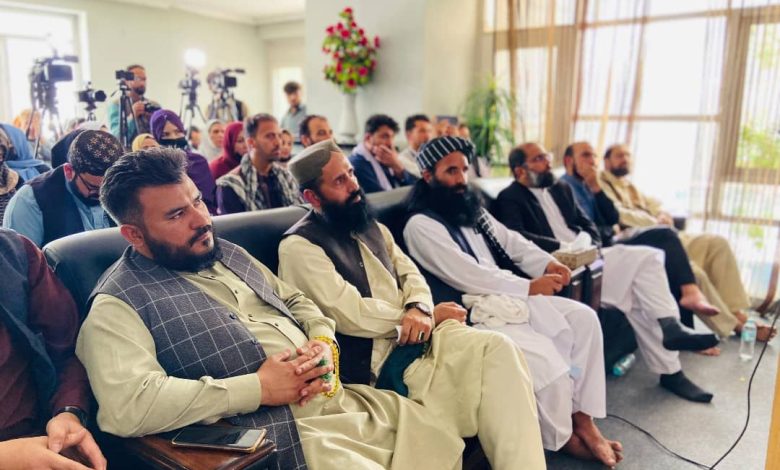
Commemoration of May 3rd, World Press Freedom Day
Commemoration of May 3rd, World Press Freedom Day by the Afghan Media Organization and the Afghan Women Journalists' Association
Continuing their ongoing activities, the Afghan Media Organization and the Afghan Women Journalists’ Association commemorated May 3rd, World Press Freedom Day, this year with the participation of prominent media, cultural, and political figures.
Alhaj Abuzar SaremSarpuli, Chief Executive of the Federation of Afghan Journalists and Media Organizations and Director General of the Afghan Media Organization, congratulated journalists on this day and urged them to strive for greater unity, emphasizing that solidarity among journalists can pave the way for professional advancement in the current circumstances.
He highlighted the existing challenges in media operations and stressed that the Afghan Media Organization aims to create better conditions for journalists, especially freelancers. To this end, a fully equipped studio is being prepared for journalists, particularly freelancers.
Sarpuli also called on the Islamic Emirate government to take practical steps regarding access to information, cooperation with the media, and improving the economic situation of journalists.
He further urged the government and journalist support organizations to pay serious attention to the condition of Sayed Ahmad Rashid Kashifi, a dedicated and ill journalist.
He stated: “Kashifi is struggling with severe psychological and respiratory issues, and unfortunately, some individuals and organizations have exploited his situation instead of providing genuine support. Recordings from Kashifi’s automatic call recording device reveal inappropriate exploitation by certain individuals.
While Kashifi has made some mistakes, he is largely a victim of his ignorance and illness. I hope the government, as it has graciously pardoned some journalists at our request in the past, will also make a compassionate decision regarding Kashifi.”
Mashuda Sarwari, the head of the Afghan Women Journalists’ Association, also spoke at the event, stating that female journalists face economic difficulties, lack of capacity building, and negligence. She emphasized that the Afghan Women Journalists’ Association is the only active organization in this field within the country but is itself in serious need of support. Sarwari called on the government and responsible institutions to support female journalists and to put an end to the self-sabotage within the media community.
She added:
“By organizing three major programs and abiding by the law, we witnessed that the government not only did not interfere but actually supported us by attending the events. Unfortunately, in the past, some organizations, under the pretext of government directives, prevented us from organizing programs, but experience has shown that these claims were false and stemmed from destructive mentalities.”
Mohebullah Akhundzada, a political and security affairs analyst, also stated during the ceremony:
“Journalists are the main pillars of the system, and commemorating this day is their undeniable right. Despite widespread financial difficulties, journalists must be prioritized for support, because today we need them more than ever. We also pray for Mr. Kashifi, hoping he will soon return to the warm embrace of his family.”
Sayed Yasin Mateen, the head of the National House of Afghan Journalists, called on the government to enhance cooperation with journalists in the field of information dissemination and to facilitate media funding through private sector investment.
Tamana Mangal, a media activist and entrepreneur, stated: “This day is an opportunity to appreciate the tireless efforts of journalists. We hope that restrictions in the field of information dissemination will decrease day by day.”
Hojatullah Mujaddidi, head of the Afghan Free Journalists’ Union, emphasized during the ceremony that psychological security stems from journalists’ job security. He added: “No media employee enjoys job security, and this is one of our serious concerns. As organizations supporting journalists, we are preparing a comprehensive plan to present to the Ministry of Information and Culture to take practical and effective steps in ensuring journalists’ job security.”
He also stated: “In these difficult conditions, the media need comprehensive support. Our organization has endeavored to be the voice of the media and journalists and always stand by them.”
Beyond his speech at the program, it should be emphasized that Mr. Ahmadzadeh has been and continues to be a close associate of the Afghan media institution and the Afghan Women Journalists’ Institution. He is a cultural, media, and literary figure who has always served as an influential advisor to these two institutions.
In the realm of writing articles, analyses, and content management, Mr. Ahmadzadeh has not only authored significant and strategic materials but his guidance has played a pivotal role in directing and building the capacity of these two institutions. It can be confidently said that Ahmadzadeh is among the intellectual and practical founders of these two institutions, and despite his numerous responsibilities in the union, he has always prioritized solving the problems of these institutions.
It is appropriate for the Afghan media institution and the Afghan Women Journalists’ Institution to sincerely appreciate his valuable efforts.
In conclusion, Shabana Nozhat, spokesperson for the Afghan Women Journalists’ Institution, thanked all the heads of the institutions and journalists present, stating: “This institution always strives to serve the media community, especially female journalists.”
